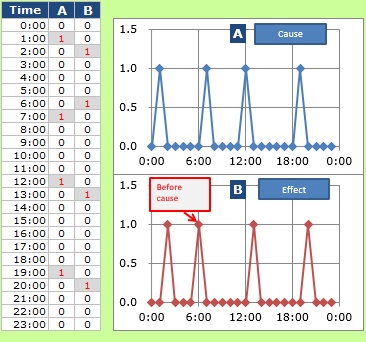
If there is a causal relationship, the event that you think is the cause should have occurred before the event that you think is the result. In this data , the causal hypothesis is incorrect because when looking at the timing of cause and effect, the cause may occur before the effect, and conversely , the effect may occur before the effect. Then?

The hypothesis may be wrong. But the right possibilities still remain. You need to see how the time data is recorded.
As you can see on the Causal Time Difference page, it is common sense to think that the result is later when considering the relationship between the cause and the effect. In causal inference and time series analysis , this common sense is used to test hypotheses and create theories.
However, even if it doesn't happen in the real world, in the world of data, it can happen that "the result is earlier in time ".
For example, "I operated the machine at 8:00. I made a defective product at 7:59."
From the context of the time, it is possible to think that "I wondered if I operated the machine because I made a defective product?", But I can't think that "I made a defective product because I operated the machine."
However, in the actual data analysis, even if the phenomenon that "a defective product was made because the machine was operated" is correct, "the machine was operated at 8:00. The defective product was made at 7:59". That is possible.
The causes of "the result is earlier than the time" are as follows.
From experience, if what you think "may be the cause" happens an hour or a day after the result, it's likely that the causal hypothesis is wrong.
However, as in the question at the beginning of this page, if both "cause after result" and "cause before result" occur, or if the data is recorded at 1-minute intervals, the result. If something that might be the cause is happening after a few minutes, the hypothesis may be correct.
Since the correctness of the hypothesis has not been verified in the context of the time data, it is necessary to investigate the mechanism by which the data is recorded in both the causal system and the effect system in the subsequent analysis. It's quite difficult.
